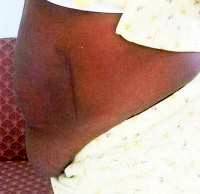Tummy tuck for overweight
A tummy tuck will be a great option for you in the future once you lose your unwanted weight by following a weight loss regime that includes a strict low-fat diet and exercise.
Once you have reached your desired weight, then a tummy tuck will help in contouring and tightening the abdomen.
I highly advise you to go to a board certified plastic surgeon that specializes in body contouring procedures when opting for plastic surgery.
Do your research by going on consults, and educating yourself on your surgeon of choice. (Siamak Agha, MD, PhD, FACS, Orange County Plastic Surgeon)
Not ideal to get a tummy tuck when you are overweight
Ususally someone at your weight someone doesn’t have a abdominoplasty or tummy tuck. You may want to consider panniculectomy – getting rid of the hanging tissue in the mid section.
This is only if the mid section is large and causing problems due to irritation of skin, sweat accumulation or skin breakdown underneath the area.
This would improve the quality of life, but not the overall look. At this weight, I would recommend to loose about 50-60 pounds before doing the abdominoplasty otherwise the results would only be marginal. And because of the weight you are at a high risk for post operative complications. (Usha Rajagopal, MD, San Francisco Plastic Surgeon)
Weight loss after a tummy tuck.
Tummy tucks are an extremely popular and effective way to recontour the abdomen and torso. Patients received their best result when they are at their stable weight. At this time, you would best be served by continuing a rigorous exercise regimen and staying on a healthy low-fat diet. Once you have lost as much weight as is possible and you have maintained this weight for at least 4 to 6 months, make a consultation with a board-certified plastic surgeon who has a great deal of experience working with abdominal contouring and abdominoplasty. They will be able to determine what combination of techniques will help you meet your goals. (Pat Pazmino, MD, Miami Plastic Surgeon)
Excess fatty tissue and tummy tuck
At 5’3″ and 235 lbs I would recommend dieting first to lose more weight before undergoing a full tummy tuck. The complication rate would go down and you would get a better result. (Steven Wallach, MD, Manhattan Plastic Surgeon)
Reaching your goal weight prior to tummy tuck surgery
Based on the photo you provided, I think it would be in your best interest to reach your goal weight before considering a tummy tuck procedure. You will have better results if you are at your ideal weight prior to surgery. This will lower your risks of any complications during and after surgery. Tummy tucks and liposuction involves very invasive surgery which will require a lot of recovery time and a good support system. The most important part of proceeding with surgery is finding a board certified plastic surgeon to perform it safely. (Tom J. Pousti, MD, FACS, San Diego Plastic Surgeon)
Tummy Tuck risks are higher for overweight patient
At your weight, you are at higher risk for surgery. If you will be satisfied with just removal of the overhanging skin and fat then you can do that. If you are looking for a narrow waist, body sculpting, and curves, then you need to lose about 100 lbs. (Samir Shureih, MD, Baltimore Plastic Surgeon)
I would recommed losing weight before considering a Tummy tuck. After losing the weight a Tummy Tuck will help reduce any excess skin and Liposuction could be done to better contour your hips. (Sharon Theresa McLaughlin MD)
Your first concern should be your health. You are presently at a very dangerous body mass index (BMI), which is increasing your likelihood of developing life threatening conditions such as high blood pressure, heart disease and diabetes.
The BMI will not change after a tummy tuck operation and the risks of surgery are very high in your condition. The fact that your results will not be great with a tummy tuck is really secondary to the risk to your health. (Kenneth R. Francis, MD, )








